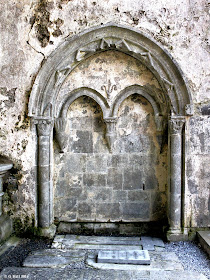Above Image: The central tower
Above Image: Entrance door
Above Image: Niche & effigy of King Conor O'Brien
Above Image: The East gable
Above Image: Presbytery & side Chapels
Above Image: Decorative vaulted ceiling
Above Image: The West gable
Above & Below Images: ancillary ruins
This remarkable Abbey ruin lies on the Northern end of the
Burren area in Co Clare. It is thought to have been constructed under the
patronage of Donal Mór Ua Briain for the Cistercian order in the early 13th
century. A great deal of work was applied to this Abbey particularly in its
ornamental carvings and detailed masonry. The Abbey and lands were passed to
the Earl of Thomond in 1554 after the dissolution of Abbeys but the Cistercian
order maintained the Abbey until the 17th century until its last Abbott
John O’Dea died. It was once known as St. Mary of the fertile rock referring to
the rich soil of the surrounding Burren.
Firstly I should advise that if making a visit here and to
get the full effect of the wonderful architecture I would try to make an early
morning visit if possible. Around 10.30am the tour buses begin to arrive and
both the car park and the ruins become congested. We arrived on our visit
around 10.15am and drove up the long narrow lane that leads to the Abbey.
Looking like we were going to be the only visitors I stopped the car to take a
distance shot of the ruins but looked over my shoulder at a noise behind me and
to my horror saw that a large tour bus was trundling up the lane way.
We drove up the lane quickly and parked running like fools into Abbey
to get a head start. I wanted to take some photos inside devoid of people but
minutes later they arrived disgorging from the bus and swarming into the ruins
like a river of hot molasses. It was impossible to enjoy with all the commotion.
So we sat down on an outside wall and thankfully around 15 minutes later the
crowd had dispersed and returned to the bus to be swept off to some other 15
minute historical visit.
With the visitors gone these ruins take on a totally
different atmosphere. They are so nicely positioned in a valley with
surrounding naked limestone hills. Within the silent walls there are really
some beautiful carvings and arches to be seen. The Abbey is in a cruciform
shape with two small side chapels in the wings. Both the West and East gables
have tall lancet windows. Within the choir we came across a tomb niche holding
an effigy of King Conor O’Brien, who died in 1267.The wonderful presbytery section has decorative arches that lead to two side chapels in the transepts. The central arch has a beautifully carved vaulted ceiling. In the centre of the ruins are the remains of a tower which divides the Abbey and loftily overlooks the area below.
Walking around these ruins especially when they are empty is
an absolute joy.
Around the main ruins are some ancillary ruins that stretch
out into the surrounds giving the location an even more elaborate feel.
There is a cemetery in use around part of the ruins and the Abbey seems to be
kept well. If in the area do take some time out to visit these ruins, you won’t be
disappointed in the least.To find Corcomroe Abbey follow these directions. From Kinvarra take the N67 heading West and after approx. 7KM take a left hand turn onto the L1014 signposted for Carron. Drive for approx. 4.5KM until you see a right hand turn for the L1016. There is a sign pointing to the Abbey. Turn right onto this road and continue for approx. 750m until you see a series of sheds on your left. You will then see another sign for the Abbey pointing to a lane on the right. Turn right up this lane and drive approx. 1.25Km and you will reach the Abbey car park. As mentioned previously go early.






















wonderful , just wonderful ! thank you for posting these pictures.. they make me feel like i am back in Insle of Gotland in the baltic sea where my mothers family come from.. a very much alike nature and buildings or ruins of churches and houses from late 12 and early 13th century .. all built in same manner with lime stones and sand stone carvings ..
ReplyDeleteThank you for your kind words. That is most interesting news about Gotland I really must make a visit sometime to see these ruins.
Delete